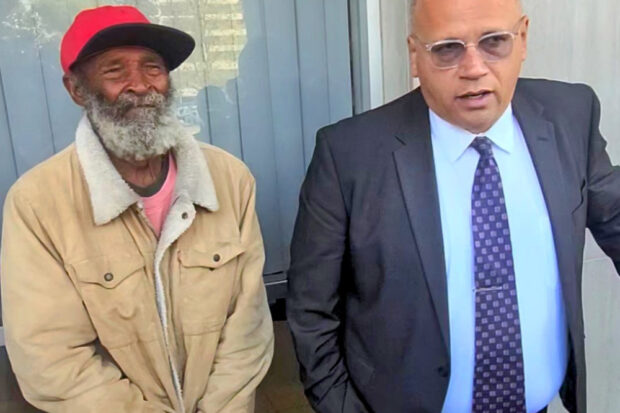
On April 10, Fresno Superior Court Judge Brian Alvarez ruled that the Fresno City Attorney’s Office failed to meet the 45-day deadline to bring an unhoused individual to trial; 77-year-old Wickey Two Hands was accused of violating the City’s harsh no camping ordinance implemented on Sept. 23, 2024. California law states that a defendant on a misdemeanor charge must be brought to trial within 45 days, if out of custody.
Attorney Kevin Little, representing Two Hands, said, “On Feb. 20, we insisted on our right to a speedy trial and objected to any postponement. Today is well beyond the deadline so this judge just wasn’t having it. He saw that this was not a lawful continuance and therefore dismissed the case.”
Judge Alvarez noted that the case should have been heard by March 6.
Two Hands, the defendant, said he was glad it was over. “I think I deserve [this dismissal] and want to thank Kevin. He has my admiration.” He said he has lost work because of the trial and that he holds down several jobs. He has been offered a housing voucher, but it could take weeks to get an apartment.
On April 10, the City again offered Two Hands a diversion program before the case was rapidly dismissed. These programs often involve rehabilitation, community service or other interventions designed to address “the behavior” that led to the arrest. In this case, there were no substance abuse issues, the defendant had several jobs and his only “crime” was being unhoused at the time of his arrest.
To date, there have been more than 400 arrests in Fresno for violations of the no camping ordinance and numerous citations. The Democratic majority on the City Council passed the no camping ordinance following a Supreme Court ruling that allowed cities to enforce camping bans, even when shelter is unavailable.
The Democrats on the Council sided with the conservative Republican justices on the court, ignoring the three liberal justices who said in the dissenting opinion that allowing municipalities to arrest people is criminalizing a basic human function: sleeping.
The Fresno ordinance “criminalizes people’s existence,” said Little. “It sends them into hiding.” He was a bit disappointed with the dismissal in that he had wanted to take the Two Hands case before a jury and pursue it on legal grounds.
“Sooner or later, we’ll have our day in court,” added Little. “[But] if the City never takes these cases to court, it begs the question: Why do we even have this stupid ordinance in the first place?”
The blatant disregard for time limits by the City Attorney’s Office raises the question if that was intentional to avoid a jury trial. Several more cases are being set for trial.
More than 25 California cities have passed similar ordinances. In response to the proliferation of such ordinances, many California cities, including Fresno, have increased sweeps of encampments, leading to the displacement of unhoused individuals, with little to no guarantee of alternative housing or services.
Violations of anti-camping laws can result in fines and even jail time. Criminalization can make it harder for unhoused individuals to find stable housing and employment, as arrests and criminal records can create barriers.
Arrests and sweeps increase morbidity and mortality rates, as the stress of frequent moves and interactions with law enforcement can exacerbate health problems. In addition, jail stays can disrupt access to benefits, shelter and other crucial resources. Displacement and criminalization can be traumatizing and damaging to the health and well-being of unhoused individuals, according to the research.
Criminalization is also ineffective in solving homelessness and addressing the root causes of homelessness, which include lack of affordable housing, and can even perpetuate the cycle of homelessness. Moreover, it costs taxpayers; arresting and incarcerating unhoused individuals under laws that criminalize homelessness is expensive. In addition, the criminalization of homelessness can increase the risk of violence against unhoused individuals and increase their interactions with law enforcement.
In response to the many no camping ordinances, SB 634, introduced on March 24 by State Senator Sasha Pérez (D–Alhambra), is working its way through the legislative process. If enacted into law, the bill would prohibit local and state authorities from imposing penalties, including jail time and fines, on unhoused individuals for acts related to their basic survival, and protects those providing assistance to homeless individuals.
Take Action
Please contact your state legislators and ask them to support SB 634, which would prohibit local and state authorities from imposing penalties on unhoused individuals for acts related to their basic survival.
State Senators for the Central Valley
4th District Marie Alvarado-Gil 916-651-4004
12th District Shannon Grove 916-651-4012
14th District Anna Caballero 916-651-4014
16th District Melissa Hurtado 916-651-4016
You can leave a comment at senate.ca.gov/senators by selecting “Contact” for the respective state senator.
Assembly Members for the Central Valley
8th District David Tangipa 916-319-2008
27th District Esmeralda Soria 916-319-2027
31st District Joaquin Arambula 916-319-2031
33rd District Alexandra Macedo 916-319-2033
35th District Jasmeet Kaur Bains 916-319-2035
You can leave a comment at assembly.ca.gov/assemblymembers by selecting “Contact” for the respective Assembly member.
Also, contact Fresno’s mayor and City Council members and ask them to rescind the inhumane no camping ordinance and provide real solutions for the housing crisis, such as rent control, building low income housing, establishing tiny home villages and supporting safe camps as an interim solution.
Fresno Mayor Jerry Dyer
559-621-8000 jerry.dyer@fresno.gov
Fresno City Council Members
559-621-8000
Annalisa Perea district1@fresno.gov
Mike Karbassi district2@fresno.gov
Miguel Arias district3@fresno.gov
Tyler Maxwell district4@fresno.gov
Brandon Vang district5@fresno.gov
Nick Richardson district6@fresno.gov
Nelson Esparza district7@fresno.gov
You can also leave a comment at fresno.gov/citycouncil by selecting the respective City Council member.
